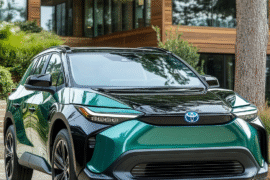This article may contain references to products or services from one or more of our advertisers or partners. We may receive compensation when you click on links to those products or services. Nonetheless, our opinions are our own.
The information presented in this article is accurate to the best of our knowledge at the time of publication. However, information is subject to change, and no guarantees are made about the continued accuracy or completeness of this content after its publication date.
If you’ve recently bought an electric vehicle (EV), you’ll likely be excited to start driving around in your new, battery-powered car. However, before you can drive off into the sunset, you must insure your EV.
But what insurance do you need? The answer is simple: Electric car insurance.
Read on and discover the complete lowdown on what EV insurance is, why you need it for your car, and what the many perks are of this type of policy.
What is electric car insurance?
EV insurance is a unique type of policy required for drivers of any electric car. The policy works in a similar way to most types of insurance you’re familiar with – such as that of gas-powered cars.
It gives you and your vehicle coverage for a range of different things, depending on the type of cover you choose, and your insurance provider will charge you premiums which factor in different aspects of your driving.
In terms of finding the best insurance for you, check out how to insure your electric vehicle with Lemonade Car, where you could be eligible for bonus coverages for the fairest price available.
Why do you need electric car insurance?
You need electric car insurance if you own any type of electric vehicle, as it’s the only way you can legally drive your EV on the road. Standard insurance will not cover your EV, so an EV insurance policy is a must!
EVs have their own type of insurance due to the fact that EVs are designed and operated differently from standard gas cars.
For instance, EVs have a unique design which is made from special components. Among other things, the cars run on lithium-ion batteries which power electric motors to propel the car.
This means any replacements or repairs will need to be carried out by a specialist mechanic, who can find the right parts to work on your EV.
This is one of the many reasons why standard insurance cannot cover your EV, and you’ll need electric car insurance to give you legal coverage.
What are the perks of electric car insurance?
When taking out an EV insurance policy, you’ll find there are many perks it brings to you and your car, which include:
Planet-friendly discounts
One of the main perks of owning an EV is that you can gain discounts on your premiums for driving a more environmentally-friendly type of vehicle.
EVs are built to be more fuel efficient when driving. With hybrids and plug-in hybrids, you burn significantly less fuel for every mile you drive, than that of gas-powered cars. With fully electric vehicles, there’s no fuel burned whatsoever.
This is important since burning fuel in your car produces carbon dioxide (CO2) emissions, and these are harmful to the earth’s ozone layer. In short, these emissions contribute greatly towards global warming.
Therefore, by driving an EV – which burns less, to no fuel – you’re helping improve the planet. And as a result, insurers can offer you discounted premiums as a reward for greener driving.
Voted "Best Overall Budgeting App" by Forbes and WSJ
Monarch Money helps you budget, track spending, set goals, and plan your financial future—all in one app.
Get 50% OFF your first year with code MONARCHVIP
Essential EV coverage
Another key benefit of EV insurance is that you can gain a variety of essential coverage for, not only your vehicle, but every important aspect of your driving.
For example, on top of gaining cover for your car, you can insure all the many charging components that are needed for it. With charging being a vital part of EVs, many drivers have charging stations at their homes or portable chargers for when they’re on the move.
With EV insurance, you can include these important components in your policy, so they have the same beneficial cover that your car itself has.
As well as this, you can also gain cover for any roadside assistance, such as when you might need to be towed to the nearest charging station if your car runs out of battery.
With more flexible and extensive cover, you can rest assured your EV is protected when out on the road with EV insurance.

Reviewed and edited by Albert Fang.
See a typo or want to suggest an edit/revision to the content? Use the contact us form to provide feedback.
At FangWallet, we value editorial integrity and open collaboration in curating quality content for readers to enjoy. Much appreciated for the assist.
Did you like our article and find it insightful? We encourage sharing the article link with family and friends to benefit as well - better yet, sharing on social media. Thank you for the support! 🍉
Article Title: What Insurance Do I Need for My Electric Car?
https://fangwallet.com/2023/01/05/what-insurance-do-i-need-for-my-electric-car/The FangWallet Promise
FangWallet is an editorially independent resource - founded on breaking down challenging financial concepts for anyone to understand since 2014. While we adhere to editorial integrity, note that this post may contain references to products from our partners.
The FangWallet promise is always to have your best interest in mind and be transparent and honest about the financial picture.
Become an Insider

Subscribe to get a free daily budget planner printable to help get your money on track!
Make passive money the right way. No spam.
Editorial Disclaimer: The editorial content on this page is not provided by any of the companies mentioned. The opinions expressed here are the author's alone.
The content of this website is for informational purposes only and does not represent investment advice, or an offer or solicitation to buy or sell any security, investment, or product. Investors are encouraged to do their own due diligence, and, if necessary, consult professional advising before making any investment decisions. Investing involves a high degree of risk, and financial losses may occur including the potential loss of principal.
Source Citation References:
+ Inspo












































